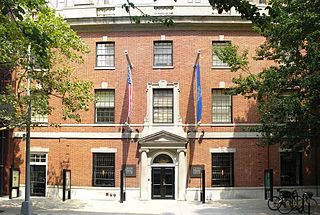 W
WThe Vilna Ghetto was a World War II Jewish ghetto established and operated by Nazi Germany in the city of Vilnius in the modern country of Lithuania, at the time part of the Nazi-administered Reichskommissariat Ostland.
 W
WThe Fareynikte Partizaner Organizatsye was a Jewish resistance organization based in the Vilna Ghetto that organized armed resistance against the Nazis during World War II. The clandestine organisation was established by Communist and Zionist partisans. Their leaders were writer Abba Kovner, Josef Glazman and Yitzhak Wittenberg.
 W
WGhetto is a play by Israeli playwright Joshua Sobol about the experiences of the Jews of the Vilna Ghetto during Nazi occupation in World War II. The play focuses on the Jewish theatre in the ghetto, incorporating live music and including as characters historical figures such as Jacob Gens, the chief of the Jewish Police and later Head of the ghetto. It is part of a triptych of plays about the resistance movement, which also includes Adam and Underground. Ghetto premièred at the Haifa Municipal Theatre in Israel and the Freie Volksbühne, Berlin, in 1984, with folk and jazz singer, Esther Ofarim as Hayyah
 W
WKailis forced labor camp was a Nazi labor camp for Jews in Vilnius during World War II. It was based on a pre-war fur and leather factory and mostly produced winter clothing for the German military. At its peak, after the liquidation of the Vilna Ghetto in September 1943, the camp housed about 1,500 Jews. The camp was liquidated and its workers executed at Ponary on 3 July 1944, just ten days before Red Army captured the city.
 W
WThe Paper Brigade was the name given to a group of residents of the Vilna Ghetto who hid a large cache of Jewish cultural items from YIVO, saving them from destruction or theft by Nazi Germany. Established in 1942 and led by Abraham Sutzkever and Shmerke Kaczerginski, the group smuggled books, paintings and sculptures past Nazi guards and hid them in various locations in and around the Ghetto. After the Ghetto's liquidation, surviving members of the group fled to join the Jewish partisans, eventually returning to Vilna following its liberation by Soviet forces. Recovered works were used to establish the Vilna Jewish Museum and then smuggled to the United States, where YIVO had re-established itself during the 1940s. Caches of hidden material continued to be discovered in Vilna into the early 1990s. Despite losses during both the Nazi and Soviet eras, 30–40 percent of the YIVO archive was preserved, which now represents "the largest collection of material about Jewish life in Eastern Europe that exists in the world".
 W
WTheodor Adrian von Renteln was an activist and politician in Nazi Germany. During World War II, he was General Commissioner of Generalbezirk Litauen and was involved in perpetrating the Holocaust in Lithuania.
 W
WOna Šimaitė was a Lithuanian librarian at Vilnius University who used her position to aid and rescue Jews in the Vilna Ghetto during World War II. She is recognized as a Righteous Among the Nations.
 W
WMartin Weiss was a Nazi official and de facto commander of the Vilna Ghetto and a Holocaust perpetrator. He was also the commander of the notorious Nazi-sponsored Ypatingasis būrys killing squad, which was largely responsible for the Ponary massacre where approximately 100,000 people were shot.
 W
W"Zog nit keyn mol" sometimes "Zog nit keynmol" or "Partizaner lid" [Partisan Song]) is a Yiddish song considered one of the chief anthems of Holocaust survivors and is sung in memorial services around the world.